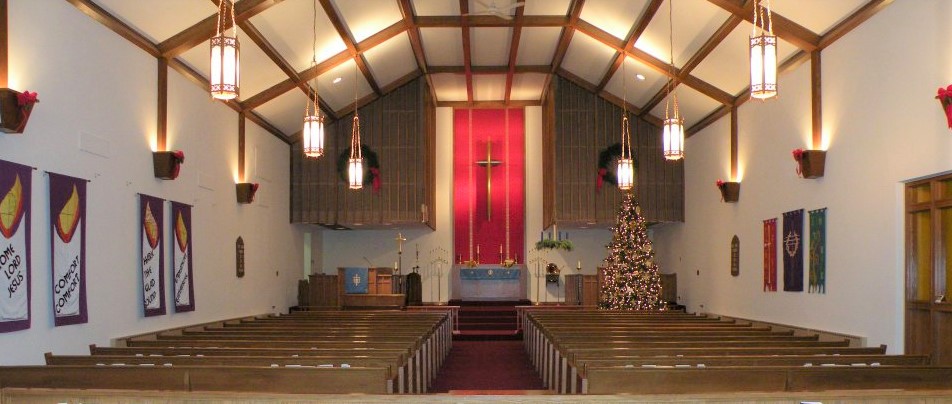Sermon 07 05 2020
P5A 2020 Matthew 11:16-19, 25-30
Some of you know or know of my dog Otto. He loves to be outside, I’m sure partly because Labradors are bred as sporting dogs, but probably also because he was raised to enjoy the outdoors; I think he was only 10 weeks old when he spent his first week at Camp Sequanota. The other thing he really loves is people; he doesn’t like to be out of sight of his people. So there is a predictable pattern every morning when I come downstairs and slide open the door to the back porch to let the breeze come through, and Otto runs to be outside, refuses to come in until I shut the screen door, and then immediately sits and whines at the closed door until I let him back in with me. I also have two cats who would love to be indoor and outdoor cats, but are exclusively indoor cats because they both lack the instinct or intelligence to survive outside for any amount of time. But those who have indoor/outdoor cats often say the same is true for them—they demand to be let out apparently just so they can demand to be let back in. Before we are too hasty to judge animals for never wanting to be where they’re supposed to be, Jesus reminds us that human nature is pretty much the same.
We should remember that Jesus lived in a specific time and place, so like all of scripture, the gospels only truly make sense when we read them in their historical and cultural context. But can we really say that our generation or any generation is that much different than the generation which Jesus critiques for ignoring God’s calling, no matter how that message is conveyed? I imagine that there are some parents who, over the past few months, have had more occasion than usual to compare their children to the children Jesus uses as an example here: We’re bored. We don’t want to play wedding. We don’t want to play funeral. We don’t want to do whatever you suggest. But the kids’ behavior is understandable; Jesus is more concerned with the adults, the ones who are presumably wiser and more mature, but who have reacted in the same way.
God spoke to the people through John the Baptist. John acted and preached and ate and dressed and probably smelled like a typical Old Testament prophet, living out in the wilderness, eating locusts and wild honey, dressing in camels hair, yelling at the scribes and Pharisees to repent like the brood of vipers that they were. Did they receive his message? No; they accuse John of being possessed and, a few chapters later, silence him
by beheading him. Jesus, on the other hand, does not live the ascetic lifestyle. He eats and drinks and socializes like everyone else. Do they receive his message? No; they accuse him of being a glutton, a drunkard, and a friend of low-lifes, and several chapters later, silence him by hanging him on a cross. God tries this approach; the people don’t listen. God tries the opposite approach; the people still don’t listen. It’s almost as if the method isn’t the problem, and the people just don’t want to hear what God is saying.
There are certainly parallels that we could draw in our own current moment, but regardless of the specific events that are happening in the world or in our personal lives, Jesus illuminates the problem at the heart of the struggle of discipleship: sometimes we simply don’t want to do what God calls us to do. Sometimes it costs us something to work for justice; sometimes it’s more fun to opt for revenge than mercy; sometimes it’s hard to walk humbly with God. So we rationalize or justify or put conditions on the expectations of our Christian calling. And we can do that, if we want, because we know that God forgives us when we fail to love God and neighbor and even enemy. But even when we are too stubborn to see it, it should make sense to us, that when we resist the life that God calls us to live, we’re not only failing to build God’s kingdom on earth for others, we’re also acting against our own best interests. And struggling against what the God of the universe is trying to do in, with, for, and through us is going to be a heavy, wearying burden for us to carry.
The end of this passage may sound like a welcome invitation in the midst of the challenges we’re currently enduring: Come to me, all you that are weary and carrying heavy burdens, and I will give you rest…my yoke is easy, and my burden is light… That sounds like a really welcoming invitation. But Jesus really isn’t extending an invitation, making a suggestion, offering an option, recommending a choice. Jesus is commanding us to come to him, to do it his way, to stop inventing reasons why we know better than the God who created us. It just so happens that God, who loved us enough to die for us, does have our very best intentions at heart. So when we follow God’s call, we do find rest for our souls—not because loving people, which really is the root of the law—isn’t be hard work sometimes, it is—but because when we are doing what God calls us to do, we are being who God made us to be. May we all know the peace in our souls that only comes from living in harmony with the life God is calling us to live.

